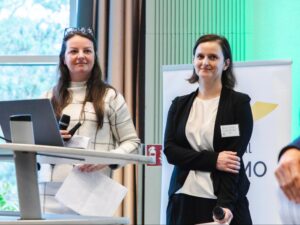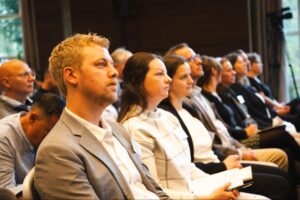For the past 30 years, the EU has been a global leader in protecting their food system from GMOs. Longstanding regulation at the federal level has meant several things: First, there is a general moratorium on the cultivation of GMOs. Second, GMOs can be approved for cultivation, but only one variety of corn has been approved across the EU – a variety of Bayer/Monsanto corn. Finally, individual member states of the EU can ban all GMO cultivation within their own borders, and most have done so. So far, only Spain has approved the cultivation of that GMO corn, meaning that most processed foods in the EU have been non-GMO by default. European shoppers have overwhelmingly rejected GMOs in their food. Still, GMOs have made their way into the EU through one channel: livestock feed. GMO soymeal feed has been common in raising cows and chickens, and this GMO feed has of course been imported from places like Brazil, the US and Canada, since it cannot legally be grown in the EU.

We have colleagues in the EU – the European Non-GMO Industry Association (ENGA) – who do what we do. They provide assurances to shoppers there that certain foods are non-GMO, especially livestock-derived foods like milk and eggs from animals that were raised on non-GMO feeds. Germany and Austria have been leaders in this respect, with VLOG (Germany) and ARGE-Gentechnik-Frei (Austria) providing important pathways for non-GMO products and the shoppers who want them, all over the EU.
Despite these efforts, the biotech industry, led by companies like Bayer, is attempting to sway EU legislators. Some countries, having long resisted GMOs, now face ministers eager to relax regulations and open the door to GMOs. Their strategy involves redefining GMOs, akin to proposals in the US, aiming for minimal oversight and labeling. They assert that new technologies, like CRISPR, pose less risk, even as the essence of genetic engineering encompasses all forms of in vitro nucleic acid techniques. However, we define GMOs as organisms to which biotech has been applied. CRISPR is a biotechnology technique, therefore products made using this technique are, by definition, GMOs.
At this time, the proposal to deregulate GMOs is being argued without yet achieving consensus, but it seems likely that there will be a new, more permissive approach to GMOs in Europe in coming years. So it was timely for our colleagues at ENGA to convene the second International Non-GMO Summit in Frankfurt, Germany earlier this month. We were honored to be invited to share our own story about protecting and promoting non-GMO choices in North America, which is, after all, the global center of GMO development and expansion, and where nearly 50% of our cultivated land is planted in GMO corn, soy, sugarbeets and canola, and where up to 75% of our groceries may contain GMO derivatives like high-fructose corn syrup, soy lecithin, sugar and so on.

The summit was attended by 160 representatives from 23 countries. It became clear that we must activate the global network of people who are working to protect shoppers’ rights to informed choice and non-GMO supply webs (including organic) in a global environment of deregulation, persistent industrialization, resurgent colonialism and biotech greenwashing.
From Mexico to Argentina, from the UK to India, from Kenya to China, biotechnologists are trying to subvert the non-GMO movement. Though our friends in the EU are looking at regulatory setbacks in their own region, they are helping activate our movement to take steps internationally. They are fostering the global community of people who believe the future must be non-GMO, organic and regenerative. We are called to join them, and already they have won policy concessions such as mandatory labeling of GMOs, traceability of GMOs and segregation of GMOs to protect non-GMO and organic food webs. It looks as if they have also secured shoppers’ rights to know what’s in their food, even if GMOs are allowed to be cultivated there.
As GMO deregulation continues worldwide, it's essential for us to unite in advocating for the expansion of non-GMO, organic and regenerative farmland. Our mission is crucial on a global scale and the International Non-GMO Summit clearly showcased our strong community and unwavering commitment to this critical cause.
